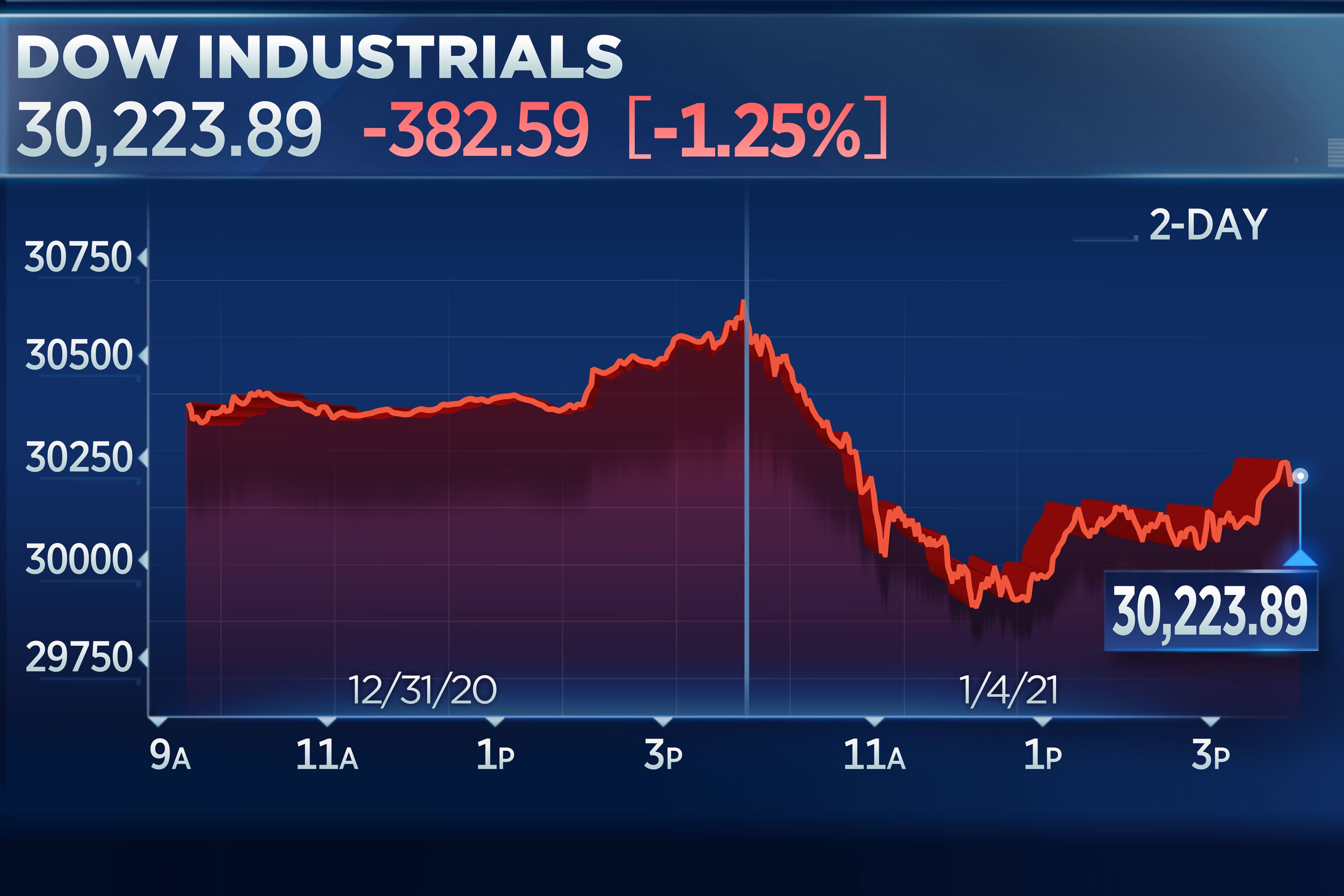Stocks begin 2021 with a sell-off, Dow drops more than 300 points

Stocks dropped on Monday, the first trading day of 2021, amid concerns about global coronavirus cases and the Georgia runoff elections.
The Dow Jones Industrial Average closed 382.59 points lower, or 1.3%, at 30,223.89. At one point, the Dow was down more than 700 points. Monday marked the first negative start to a year for the Dow since 2016.
The S&P 500 dipped 1.5% to 3,700.65. The Nasdaq Composite also slid 1.5%, ending the day at 12,698.45. Both the Dow and S&P 500 hit record highs at the open before turning lower.
It was the biggest one-day sell-off since Oct. 28 for the Dow and S&P 500, while the Nasdaq had its worst daily performance since Dec. 9.
“In my day I’ve seen a lot of wild rallies with a lot of mispriced stocks, but there is one thing they all have in common. Eventually they hit a wall and go into a major painful correction,” billionaire investor Carl Icahn told CNBC’s Scott Wapner on Monday.
Coca-Cola and Boeing were the worst-performing Dow components, falling 3.8% and 5.3%, respectively. Real estate stocks fell 3.2% to lead the S&P 500 lower.
Monday’s decline came as traders fretted over the growing number of coronavirus cases around the world and its potential impact on the global economic recovery.
In the U.K., Prime Minister Boris Johnson imposed a national lockdown on England to curb the spread of the new coronavirus variant. As part of the new restrictions, people can only leave their homes for essentials, work if they can’t from home and exercise. Most schools will also move to remote learning, including universities.
“I completely understand the inconvenience and distress this change will cause millions of people and parents up and down the country,” Johnson said. “The problem isn’t that schools are unsafe for children … the problem is that schools may act as vectors of transmission, causing the virus to spread between households.”
Data compiled by Johns Hopkins University showed more than 85 million coronavirus cases have been confirmed globally, including 20.7 million in the U.S. and 2.7 million in the U.K.
Wall Street was also keeping an eye on Georgia as the state prepares for Senate runoff elections on Tuesday, which could give Democrats a majority in the chamber.
“If the GOP wins just one seat, they will likely stonewall some of Biden’s more ambitious proposals, but a Democratic sweep of both elections might give the incoming administration free rein on their policy agenda,” wrote Jason Pride, CIO of private wealth at Glenmede.
John Stoltzfus, chief investment strategist at Oppeneheimer, said Monday the S&P 500 could fall by 10% if the Democratic candidates win the Georgia runoffs.
“It is thought by not just a few folks on Main Street as well as on Wall Street that if tomorrow’s run-off results in a sweep for the Democrats — providing them with control of the Senate as well as the House — that it would bode ill for business with the likelihood that corporate tax rates could rise substantially,” said Stoltzfus.
The 30-stock Dow ended last year with an advance of 7.3%, and the S&P 500 rose 16.3% in that time. At one point in 2020, the two market benchmarks were down more than 30% as the coronavirus pandemic ravaged the global economy. The real standout of 2020 was the Nasdaq Composite, which surged 43.6% for its biggest one-year gain since 2009.
Unprecedented fiscal and monetary support for the economy — coupled with the development and rollout of multiple Covid-19 vaccines — helped the market recover from its massive drop to trade back at all-time highs.
“The stock market is positioned for further gains in 2021 based on the twin pillars of coordinated fiscal and monetary policy from the U.S. Treasury and the Federal Reserve Board and a successful COVID vaccine rollout,” said Marc Chaikin, CEO of Chaikin Analytics. “However, we envision some bumps in the road on the way.”
Subscribe to CNBC PRO for exclusive insights and analysis, and live business day programming from around the world.




